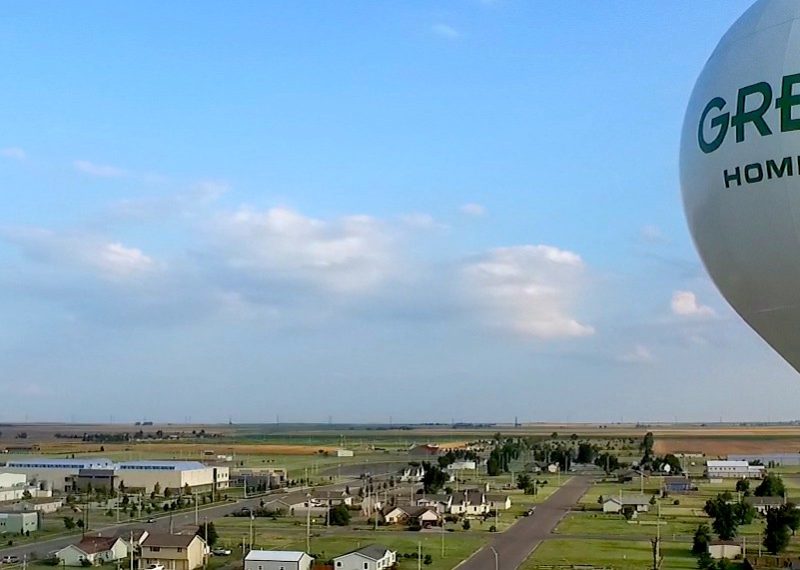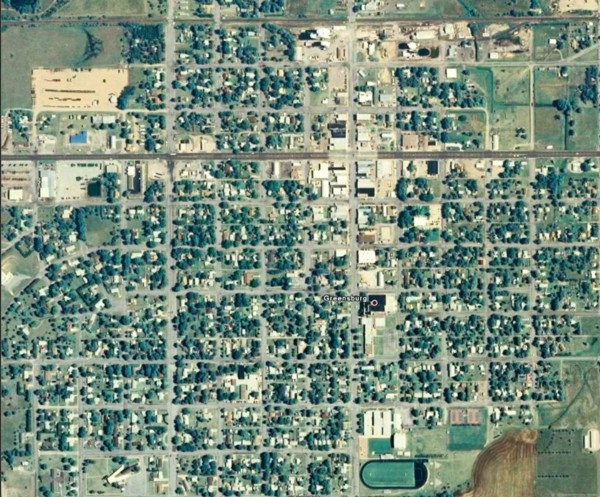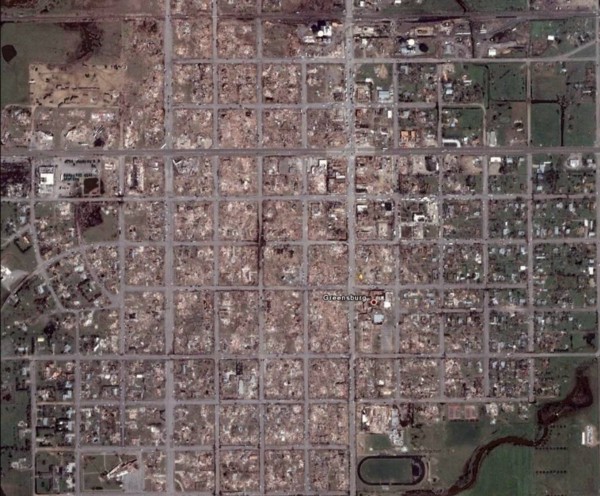It’s been a rough week for climate hawks. President-elect Donald Trump is headed to the White House, where he promises to gut federal climate policy. In light of his ascent to power, green groups are looking to alternate venues for action — namely local and regional governments.
California and New York have both doubled down on their carbon-cutting goals since Election Day. Portland mayor Charlie Hales said the federal government will not be “a block to the actions we are taking at the local level.” Climate advocates are working to bring more states and cities into the fold, and not just liberal strongholds like Portland and San Francisco.
Climate action is a tough sell in some parts of the country. The issue remains highly polarized. But falling prices for solar and wind, coupled with rapid job growth in these industries, have allowed renewable power to gain a toehold in rural America.
Just look at Greensburg, Kansas — an emerald-green town in a ruby-red state. In 2007, a massive tornado leveled Greensburg, robbing nearly every family of their home. When the town rebuilt, it embraced a low-carbon future. Its achievements offer a lesson to civic leaders, energy reformers and climate advocates in every corner of our country.
The secret? Greensburg Mayor Bob Dixson says it’s simple: Have a conversation.
“The night of the disaster we were all homeless. It mattered not your social or economic status, we were homeless,” said Dixson. “But what we did have was each other, and we need to do a better job of cultivating relationships, because that’s what makes communities sustainable.”
In the months and years that followed, the Kansas town emerged from the ashes as a green phoenix, thanks in part to Dixson’s efforts. Using money from insurance companies and FEMA, Greensburg built the highest concentration of LEED-certified buildings in the country.
Energy-efficient structures feature natural daylighting and geothermal heating and cooling. The downtown boasts walkable roads and LED street lights. Wind turbines and solar panels provide 100 percent of the town’s electricity.
Dixson said the town wanted to save money and achieve energy independence. Consume less. Generate your own electricity. Avoid the ups and downs in the price of fossil fuels. Thanks to their efforts, the people of Greensburg save hundreds of thousands of dollars each year on energy costs, a huge sum for a town of 800.
Still, recovery has been slow. The population is around half of what it was before the tornado. But the rebuilding effort has reinvigorated the community.
“Our pioneering ancestors were kind of the original green people. They lived within the resources they had available out here on the plains,” said Dixson. “We were raised as kids that if you take care of the land, it will take care of you.”
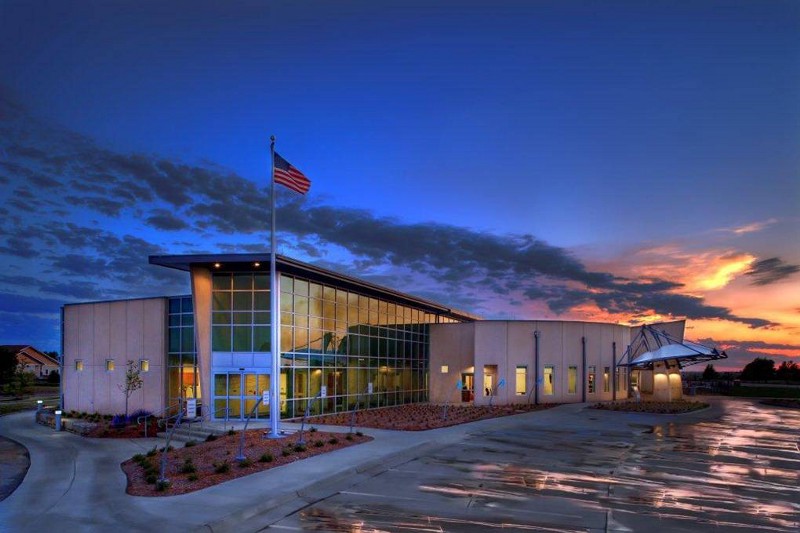
The Republican mayor avoids the language of partisan politics. Instead, he speaks to the shared values of his friends and neighbors.
“That’s really what sustainability is: the ability to endure,” said Dixson. “It’s not about being activists. It’s just the right thing to do.” The mayor believes the biggest problem with politics at the national level is a lack of engagement. Politicians are more attentive to special interests than to their constituents.
“It’s difficult at the state and the national level to be responsive to different issues without getting biases and political agendas,” said Dixson. “You can’t have elected officials dictating something that citizens don’t buy into.”
The first step for Dixson is always to understand what people want and what they need, and then to deliver it.
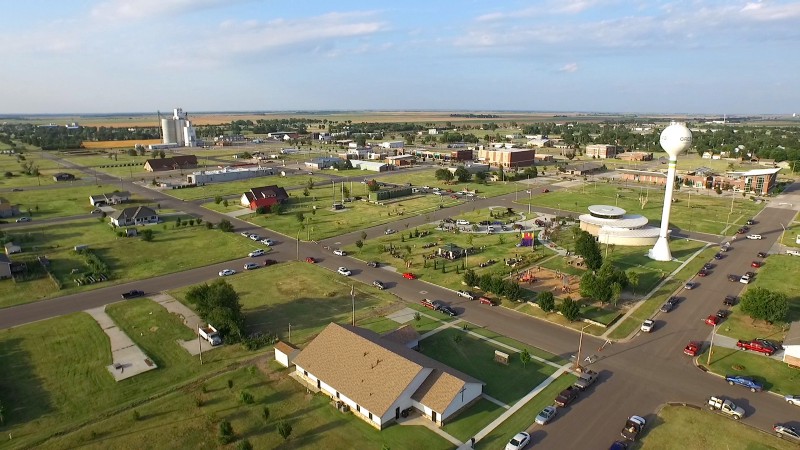
“The key in all of our processes is you have to listen. And in the United States right now we do a poor job of listening because we’re all worried about our feelings,” said Dixson. “We need good, honest open dialogue and conversation, not dictation.
“People need hope,” he said. “The hope that they have is that their voice matters.”
In Greensburg, city leaders listened to their friends and neighbors. They acknowledged their concerns. And then they educated families about the benefits of clean power and energy efficiency, including the chance to save money. People responded to that. Dixson said that the green rebuilding effort was as much about environmental stewardship as it was about fiscal responsibility.
What people resisted was not wind turbines or skylights, but top-down policymaking. Dixson didn’t change any building codes or issue any mandates. He and other city leaders earned the buy-in of Greensburg residents. With their consent, they built the town anew.
While this approach may be impractical in a big city, it works in rural America.
“I was taught years ago by my granddad and my dad that this is the greatest country in the world. And it still is, because of our freedoms,” said Dixson. “But I was also taught that our freedoms stop when they start infringing on other people’s freedoms. And so it’s just not carte blanche that we can just do everything that we think we individually think we want to do. We have to do what’s right for everybody.”
Jeremy Deaton writes for Nexus Media, a syndicated newswire covering climate, energy, policy, art and culture. You can follow him at @deaton_jeremy.

